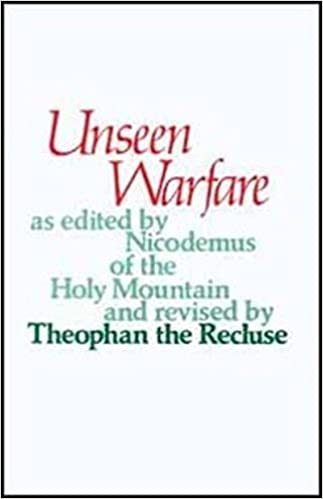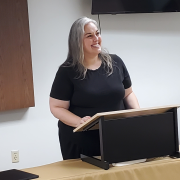
In Chapter 2 of my book Gratitude in Life’s Trenches, I discuss how spiritually unfruitful it is to beat ourselves up over our sin, or to engage in excessive grief and turmoil from our failures.
I recently came across a similar teaching in the book Unseen Warfare, a multi-author book put together by both Catholics and Orthodox, including St. Theophan the Recluse and St. Nicodemus of the Holy Mountain. These authors explained how being overburdened it is not a sign of piety but quite the opposite. From pp. 87-89 of the book:
It often happens that self-reliant men think that they have no self-reliance whatever, but put all their trust in God and rest confidently in Him alone. But in practice it is not so. They can ascertain it for themselves, if they judge by what is in them and what happens to them if they fall down. If, when they grieve at their downfall, reproaching and abusing themselves for it, they think: ‘I shall do this and that, the consequences of my downfall will be effaced and all will be well once more,’ this is a sure sign that before the downfall they trusted themselves, instead of trusting God. And the more gloomy and disconsolate their grief, the more it shows that they relied too much on themselves and too little on God; and therefore the grief caused by their downfall is not tempered by any comfort. If a man does not rely on himself but puts his trust in God, when he falls he is not greatly surprised and is not overcome with excessive grief, for he knows that it is the result of his own impotence, and, above all, of the weakness of his trust in God. So his downfall increases his distrust of himself and makes him try all the harder to increase and deepen his humble trust in God. And further, hating the vile passions which caused his downfall, he thereupon endures peacefully and calmly the labours of penitence for having offended God; and armed with still more trust in God, he thereupon pursues his enemies with the greatest courage and resoluteness, even unto death….
It is wrong to regard as a virtue the excessive grief, which men after committing a sin, not realizing that it is caused by pride and a high opinion of themselves, based on the fact that they rely too much on themselves and their own powers. For by thinking that they are something important they undertake too much, hoping to deal with it themselves. When the experience of their downfall shows them how weak they are, they are astounded, like people, who meet with something unexpected, and they are cast into turmoil and grow faint-hearted. For they see, fallen and prone on the ground, that graven image which is themselves, upon which they put all their hopes and expectations. This does not happen to a humble man who trusts in God alone, expecting nothing good from himself. Therefore, when he falls into some transgression, he also feels the weight of it and grieves, but is not cast unto turmoil and is not perplexed, for he knows that it happened through his own impotence, to experience which in downfalls is nothing unexpected or new to him….
Therefore if a soul be overburdened with sins, if it be guilty of all the crimes in the world, if it be defiled beyond imagination;—if, at the same time, to the extent of its desire and strength, it uses every means and endeavour to become free of sin and turn to the path of good, but cannot get stable in anything right, however small, and, on the contrary, sinks ever deeper and deeper into evil; even if it is all that, it must not weaken in its trust of God or fall away from Him. It must not abandon its spiritual weapons and strivings but must fight and fight, struggling with itself and with its enemies with all its courage and untiring efforts. For know and understand, that in this unseen war all are losers except a man who never ceases to struggle and keep his trust in God; for God never abandons those who fight in His armies, although at times He lets them suffer wounds.



